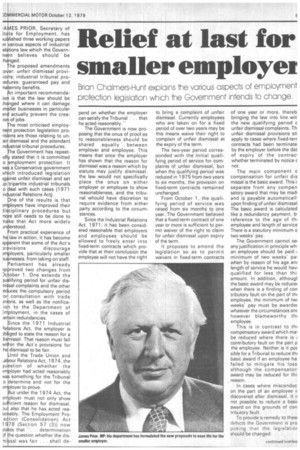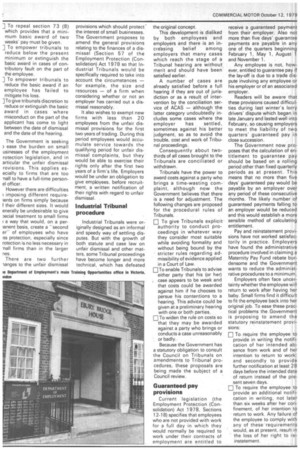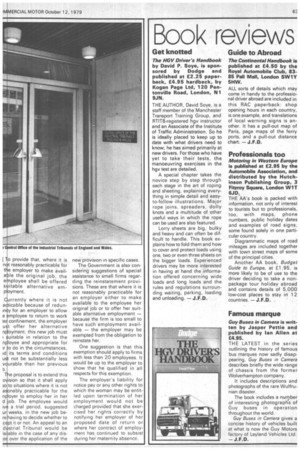Relief, at last for smaller employes
Page 63

Page 64

Page 65

If you've noticed an error in this article please click here to report it so we can fix it.
Brian Chalmers-Hunt explains the various aspects of employment protection legislation which the Government intends to change, •
IA ES PRIOR, Secretary of it te for Employment, has iu fished three working papers in arious aspects of industrial el tions law which the Govern n t believes should be nged.
he proposed amendments ;o er: unfair dismissal provi,io s; industrial tribunal pro:e ures; guaranteed pay and na ernity benefits.
n important recommendaio is that the law should be :h nged where it can damage im Iler businesses in particular kn actually prevent the creaio of jobs.
he most criticised employnt protection legislation prois ns are those relating to unai dismissal and the attendant n ustrial tribunal procedures. he Government has repeatdl stated that it is committed o mployment protection. It va a Conservative government
✓ .ch introduced legislation inst unfair dismissal and set ma tripartite industrial tribunals
o .eal with such cases (1971 n ustrial Relations Act).
ne of the results is that ployers have improved their li-ciplinary procedures but n re still needs to be done to
• ke that Act more widely
I n erstood.
rom practical experience of h law in action, it has become lp rent that some of the Act's
Dru.visions discourage ployers, particularly smaller messes, from taking on staff. arliament has already ip roved two changes from )c ober 1. One extends the lifying period for unfair disni sal complaints and the other e.uces the compulsory period o consultation with trade In ns, as well as the notificaio to the Department of
ployment, in the cases of :e ain redundancies.
ince the 1971 Industrial
ations Act, the employer is DED iged to state the reason for a us issal. That reason must fall NI in the Act's provisions for h dismissal to be fair.
ntil the Trade Union and ,a1,our Relations Act, 1974, the iu stion of whether the rrployer had acted reasonably va something for the Tribunal
o determine and not for the toyer to prove.
But under the 1974 Act, the arrjployer must not only show u4ficient reason for dismissal, Du also that he has acted rea.;() ably. The Employment Pro e tion (Consolidation) Act 1978 (Section 57 (3)) now ;ta es that ". . . determination Df he question whether the dis -n ssal was fair . . shall de
pend on whether the employer can satisfy the Tribunal : . . that he acted reasonably."
The Government is now proposing that the onus of proof as to reasonableness should be shared equally between employer and employee. This means that once the employer has shown that the reason for dismissal was a reason which by statute may justify dismissal, the law would not specifically place the onus on either employer or employee to show reasonableness, and the tribunal whould have discretion to require evidence from either party according to the circumstances. • Since the Industrial Relations Act, 1971, it has been considered reasonable that employers and employees should be allowed to freely enter into fixed-term contracts which provide that at their conclusion the employee will not have the right to bring a complaint of unfair dismissal. Currently employees who are taken on for a fixed period of over two years may be this means waive their right to complain of unfair dismissal at the expiry of the term.
The two-year period corresponded with the initial qualifying period of service for complaints of unfair dismissal, but when the qualifying period was reduced in 1975 from two years to six months, the provision on fixed-term contracts remained unchanged.
From October 1, the qualifying period of service was raised from six months to one year. The Government believed that a fixed-term contract of one year or more is sufficient to permit waiver of the right to claim for unfair dismissal upon expiry of the term.
It proposes to amend the legislation so as to permit waivers in fixed-term contracts of one year or more, thereb bringing the law into line wit the new qualifying period c unfair dismissal complaints. Th .unfair dismissal provisions sti apply to cases where fixed-terr contracts had been terminate by the employer before the dat of expiry of the contraci whether terminated by notice not.
The main component o compensation for unfair dis missal is the basic award. This i• separate from any compen satory award that may be mad' and is payable automaticall, upon finding of unfair dismissal The basic award is calculated like a redundancy payment, b. reference to the age of thi employee and length of service There is a statutory minimum o two weeks' pay.
The Government cannot sei any justification in principle wh. an employee should be paid ; minimum of two weeks' pa, when by reason of his age am length of service he would hay+ qualified for less than thi, amount. In addition, althougt the basic award may be reduce( when there is a finding of con tributory fault on the pert of thr employee, the minimum of tw( weeks' pay must be awarde( whatever the circumstances am however blameworthy the employee.
This is in contrast to the compensatory award which ma, be reduced where there is contributory fault on the part o the employee. Neither is it poE sible for a Tribunal to reduce the basic award if an employee ha. failed to mitigate his loss although the compensator, award may be reduced for thi: reason.
In cases where misconduc on the part of an employee discovered after dismissal, it not possible to reduce a basic award on the grounds of con trilautory fault.
To provide a remedy to these defects the Government is pro posing that the legislatior should be changed: jJ To repeal section 73 (8) which provides that a minimum basic award of two weeks' pay must be given. To empower tribunals to reduce below the present minimum or extinguish the basic award in cases of contributory fault on the part of the employee.
To empower tribunals to reduce the basic award if an employee has failed to mitigate his loss.
] To give tribunals discretion to reduce or extinguish the basic award in cases "where misconduct on the part of the applicant has come to light between the date of dismissal and the date of the hearing.
The Government is seeking ) ease the burden on small usinesses of the employment rotection legislation, and in articular the unfair dismissal rovisions. This applies esecially to firms that are too mall to have a full-time personel officer.
However there are difficulties imposing different requirelents on firms simply because f their different sizes. It would enerally be undesirable to give Decial treatment to small firms a way that would, on a perianent basis, create a -second erof employees who have • ss protection, especially since rotection is no less necessary in -nall firms than in the larger nes.
There are two further lenges to the unfair dismissal provisions which should protect the interest of small businesses. The Government proposes to amend the general provisions relating to the finances of a dismissal (Section 57 of the Employment Protection (Consolidation) Act 1978 so that Industrial Tribunals would be specifically required to take into account the circumstances — for example, the size and resources — of a firm when considering whether or not an employer has carried out a dismissal reasonably.
It also wishes to exempt new firms with less than 20 employees from the unfair dismissal provisions for the first two years of trading. During this period employees would accumulate service towards the qualifying period for unfair dismissal complaints, but they would be able to exercise their rights only after the first two years of a firm's life. Employers would be under an obligation to give emptoyees, before recruitment, a written notification of their rights with regard to unfair dismissal.
Industrial Tribunal procedure Industrial Tribunals were originally designed as an informal and speedy way of settling disputes. But with the growth of both statute and case law on unfair dismissal and other matters, some Tribunal proceedings have become longer and more technical, which has defeated
the original concept.
This development is disliked by both employees and employers and there is an in creasing belief among employers that many cases which reach the stage of a Tribunal hearing are without merit and should have been satisfied earlier.
A number of cases are already satisfied before a full hearing if they are out of jurisdiction or as a result of intervention by the conciliation service of ACAS — although the latter category undoubtedly includes some cases where the employer has settled, sometimes against his better judgment, so as to avoid the trouble, cost and work of Tribunal proceedings.
Consequently about twothirds of all cases brought to the Tribunals are conciliated or withdrawn.
Tribunals have the power to award costs against a party who brings a time-wasting complaint, although now the Government believes that there is a need for adjustment. The following changes are proposed for the procedural rules of Tribunals. • To give Tribunals explicit authority to conduct proceedings in whatever way they consider most suitable while avoiding formality and without being bound by the • stricter rules regarding admissibility of evidence applied in a Court of Law.
To enable Tribunals to advise either party that his (or her) case appears to be weak and that costs could be awarded against him if he chooses to persue his contentions to a hearing. This advice could be given at a preliminary hearing with one or both parties.
El To. widen the rule on costs so that they may be awarded against a party who brings or conducts a case unreasonably . or badly.
Because the Government has a statutory obligation to consult the Council on Tribunals on amendments to Tribunal procedures, these proposals are being made the subject of a Council review.
Guaranteed pay provisions
Current legislation (the Employment Protection (Consolidation) Act 1978, Sections 12-18) specifies that employees who are not provided with work for a full day in which they would normally be required to work under their contracts of employment are entitled to receive a guaranteed payment from their employer. Also not more than five days' guarantee payments are payable in any one of the quarters beginning February 1, May 1, August 1 and November 1. .
Any employee is not, however, entitled to guarantee pay if the lay-off is due to a trade dispute involving any employee or his employer or of an associated employer.
Readers will be aware • that these provisions caused difficulties during last winter's lorry drivers' dispute which began in late January and lasted well into February, so causing employers to meet the liability of two quarters' guaranteed pay in close succession.
The Government now proposes that the calculation of entitlement to guarantee pay should be based on a rolling period other than fixed quarterly periods as at present. This means that no more than five days' guaranteed pay would be payable by an employer over any period of these consecutive Months. The likely number of guaranteed payments falling to an employer would be reduced and this would establish a more sensible method of calculating entitlement.
Pay and reinstatement provisions have not worked satisfactorily in practice. Employers have found the administrative procedure involved in claiming a Maternity Pay Fund rebate burdensome and the Government wants to reduce the. administrative procedures to .a minimum.
Employers often face uncertainty whether the employee will return to work after having her baby. Small firms find it difficult to fit the employee back into her original job. To ease these-practical problems the:Government is proposing to amend the statutory reinstatement provisions: To require the employee to provide in writing the notification of her intended absence from work and of her intention to return to work; and secondly to provide further notification at least 28 days before the intended date of return instead of the present seven days. .
El To require the employee to provide an additional 'notification in writing, not later than six weeks after her confinement, of her intention to return to work. Any failure of the employee to comply with any of these requirements would, as at present, result in the loss of her right to reinstatement.
I To provide that, where it is not reasonably practicable for the employer to make available the original job, the employee shall be offered suitable alternative employment.
Currently where it is not acticable because of redunincy for an employer to allow
e employee to return to work ter confinement, the employer ust offer her alternative nployment; this new job must
uitable in relation to the
n loyee and appropriate for ir o do in the circumstances, id its terms and conditions
u t not be substantially less vc'urable than her previous b.
The proposal is to extend this °vision so that it shall apply 5ojto situations where it is not a onably practicable for the nrloyer to employ her in her d job. The employee would lye. a trial period, suggested ur weeks. in the new job bere haying to decide whether to :cept it or not. An appeal to an dustral Tribunal would be 'ai able in the case of any dis"to over the application of the
new provision in specific cases.
The Government is also considering suggestions of special assistance to small firms regarding the reinstatement provisions_ These are that where it is not reasonably practicable for an employer either to make available to the employee her original job or to offer her suitable alternative employment — because the firm is too small to have such employment available — the employer may be exempted from the obligation to reinstate her.
One suggestion is that this exemption should apply to firms with less than 20 employees. It would be up to the employer to show that he qualified in all respects for this exemption.
The employer's liability for notice pay or any other rights to which the woman may be entit led upon termination of her employment would not be charged provided that she exer cised her rights correctly by notifying her employer of her proposed date of return or where her contract of employment has continued to subsist during her maternity absence.
























































































































